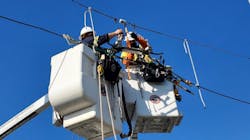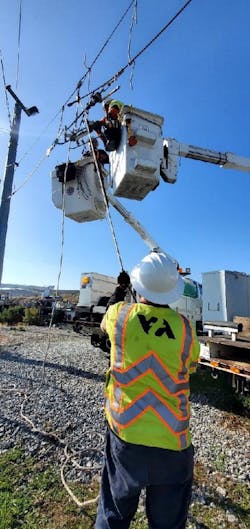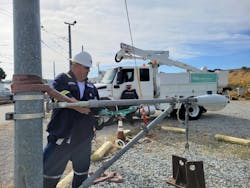Santa Clara VTA returns Overhead Line Worker Apprenticeship program after year hiatus
Santa Clara Valley Transportation Authority’s (VTA) Overhead Line Worker Apprenticeship program has returned after a year hiatus to carry on the work of VTA family members who lost their lives in the May 26, 2021, mass shooting
The “Power Crew” represents the overhead line workers who are responsible for inspecting and maintaining the electrical overhead line of VTA’s light rail system. They are the highest paid Amalgamated Transit Union (ATU) position at VTA, and the most dangerous. Because of the highly skilled technical nature of the job, it’s not an easy position to fill and despite the pay level within its union, the Bay Area cost of living only makes filling those jobs tougher.
Originally, the apprenticeship program was 18 months long, and it allowed the agency to be fully staffed in the overhead line department.
In the wake of the mass shooting, with light-rail service suspended, the apprenticeship program stalled. In August 2022, a new class started training.
What does the overhead line worker do?
During the last heat wave, the understaffed team was swamped. Scorching temperatures during the summer heatwave caused overhead electrical lines guiding the trains to sag, so these specialized teams in training were kept busy.
Working around live electricity is a serious hazard because of the dangerously high voltage.
“These people are going up in bucket trucks, several feet in the air in inclement weather, rain or during extreme heat or lighting, and they’re dealing with high voltage,” said Transportation Superintendent Steve Jovel, co-director of the partnership program Joint Workforce Investment (JWI) with ATU. “They also need to make sure the pantograph, which connects the train to the overhead line, has a clear path away. Many of those inspections are done on foot, at night and during the day, and in sections throughout the 42 miles of VTA’s light rail system.
How did the Overhead Line Worker Apprenticeship start?
About four years ago, there were six openings in the overhead line and track worker department. Since recruitment for those jobs occurs among track workers and electromechanics, JWI decided to add that job specialty to the program, taking apprentices in this order: Senior track workers, track workers, electromechanics and electronic technicians.
Training
JWI - Joint Workforce Investment
The VTA/ATU Joint Workforce Investment (JWI) Apprenticeship program is a national model as a partnership among VTA, the Amalgamated Transit Union Local 265 (ATU) and Mission College in Santa Clara, with support from the California Labor Federation and the “California Apprenticeship Initiative” of California Community Colleges.
All apprentices in the JWI program can earn up to 18 college credits during training, helping them create a path toward management positions.
Each apprentice completes 2,000 hours of classroom and on-the-job training, maintaining contact with a more experienced mentor in their job as a resource to help retain those new worker's long term.
VTA was the first transit agency in the nation to offer certified apprenticeships for coach operators and mechanics. The agency began the program with bus operators to help fill a void expected by the “Silver Tsunami,” an impending wave of retirement-eligible workers expected to leave the transit industry.
This year almost 50 workers applied for the Overhead Line Apprenticeship program. There were only eight openings. The next group of four electromechanics and trackworkers are scheduled to start the program in March or April 2023. It will be the second training class offered in the past four years.


